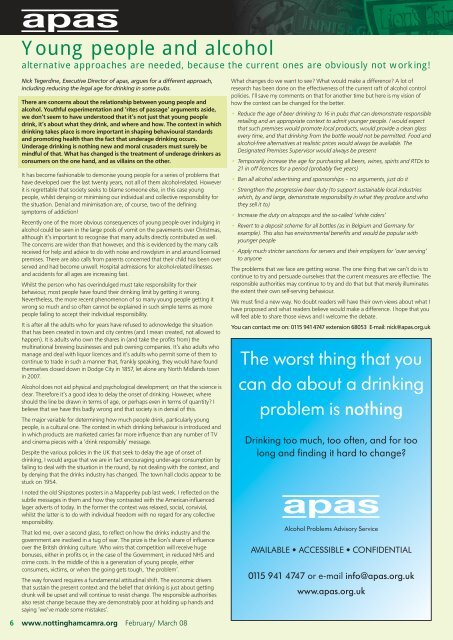New brewery and visitor centre for Belvoir - Nottingham CAMRA
New brewery and visitor centre for Belvoir - Nottingham CAMRA
New brewery and visitor centre for Belvoir - Nottingham CAMRA
Create successful ePaper yourself
Turn your PDF publications into a flip-book with our unique Google optimized e-Paper software.
Young people <strong>and</strong> alcohol<br />
alternative approaches are needed, because the current ones are obviously not working!<br />
6<br />
Nick Tegerdine, Executive Director of apas, argues <strong>for</strong> a different approach,<br />
including reducing the legal age <strong>for</strong> drinking in some pubs.<br />
There are concerns about the relationship between young people <strong>and</strong><br />
alcohol. Youthful experimentation <strong>and</strong> ‘rites of passage’ arguments aside,<br />
we don’t seem to have understood that it’s not just that young people<br />
drink, it’s about what they drink, <strong>and</strong> where <strong>and</strong> how. The context in which<br />
drinking takes place is more important in shaping behavioural st<strong>and</strong>ards<br />
<strong>and</strong> promoting health than the fact that underage drinking occurs.<br />
Underage drinking is nothing new <strong>and</strong> moral crusaders must surely be<br />
mindful of that. What has changed is the treatment of underage drinkers as<br />
consumers on the one h<strong>and</strong>, <strong>and</strong> as villains on the other.<br />
It has become fashionable to demonise young people <strong>for</strong> a series of problems that<br />
have developed over the last twenty years, not all of them alcohol-related. However<br />
it is regrettable that society seeks to blame someone else, in this case young<br />
people, whilst denying or minimising our individual <strong>and</strong> collective responsibility <strong>for</strong><br />
the situation. Denial <strong>and</strong> minimisation are, of course, two of the defining<br />
symptoms of addiction!<br />
Recently one of the more obvious consequences of young people over indulging in<br />
alcohol could be seen in the large pools of vomit on the pavements over Christmas,<br />
although it’s important to recognise that many adults directly contributed as well.<br />
The concerns are wider than that however, <strong>and</strong> this is evidenced by the many calls<br />
received <strong>for</strong> help <strong>and</strong> advice to do with noise <strong>and</strong> rowdyism in <strong>and</strong> around licensed<br />
premises. There are also calls from parents concerned that their child has been over<br />
served <strong>and</strong> had become unwell. Hospital admissions <strong>for</strong> alcohol-related illnesses<br />
<strong>and</strong> accidents <strong>for</strong> all ages are increasing fast.<br />
Whilst the person who has overindulged must take responsibility <strong>for</strong> their<br />
behaviour, most people have found their drinking limit by getting it wrong.<br />
Nevertheless, the more recent phenomenon of so many young people getting it<br />
wrong so much <strong>and</strong> so often cannot be explained in such simple terms as more<br />
people failing to accept their individual responsibility.<br />
It is after all the adults who <strong>for</strong> years have refused to acknowledge the situation<br />
that has been created in town <strong>and</strong> city <strong>centre</strong>s (<strong>and</strong> I mean created, not allowed to<br />
happen). It is adults who own the shares in (<strong>and</strong> take the profits from) the<br />
multinational brewing businesses <strong>and</strong> pub owning companies. It’s also adults who<br />
manage <strong>and</strong> deal with liquor licences <strong>and</strong> it’s adults who permit some of them to<br />
continue to trade in such a manner that, frankly speaking, they would have found<br />
themselves closed down in Dodge City in 1857, let alone any North Midl<strong>and</strong>s town<br />
in 2007.<br />
Alcohol does not aid physical <strong>and</strong> psychological development; on that the science is<br />
clear. There<strong>for</strong>e it’s a good idea to delay the onset of drinking. However, where<br />
should the line be drawn in terms of age, or perhaps even in terms of quantity? I<br />
believe that we have this badly wrong <strong>and</strong> that society is in denial of this.<br />
The major variable <strong>for</strong> determining how much people drink, particularly young<br />
people, is a cultural one. The context in which drinking behaviour is introduced <strong>and</strong><br />
in which products are marketed carries far more influence than any number of TV<br />
<strong>and</strong> cinema pieces with a ‘drink responsibly’ message.<br />
Despite the various policies in the UK that seek to delay the age of onset of<br />
drinking, I would argue that we are in fact encouraging under-age consumption by<br />
failing to deal with the situation in the round, by not dealing with the context, <strong>and</strong><br />
by denying that the drinks industry has changed. The town hall clocks appear to be<br />
stuck on 1954.<br />
I noted the old Shipstones posters in a Mapperley pub last week. I reflected on the<br />
subtle messages in them <strong>and</strong> how they contrasted with the American-influenced<br />
lager adverts of today. In the <strong>for</strong>mer the context was relaxed, social, convivial,<br />
whilst the latter is to do with individual freedom with no regard <strong>for</strong> any collective<br />
responsibility.<br />
That led me, over a second glass, to reflect on how the drinks industry <strong>and</strong> the<br />
government are involved in a tug of war. The prize is the lion’s share of influence<br />
over the British drinking culture. Who wins that competition will receive huge<br />
bonuses, either in profits or, in the case of the Government, in reduced NHS <strong>and</strong><br />
crime costs. In the middle of this is a generation of young people, either<br />
consumers, victims, or when the going gets tough, ‘the problem’.<br />
The way <strong>for</strong>ward requires a fundamental attitudinal shift. The economic drivers<br />
that sustain the present context <strong>and</strong> the belief that drinking is just about getting<br />
drunk will be upset <strong>and</strong> will continue to resist change. The responsible authorities<br />
also resist change because they are demonstrably poor at holding up h<strong>and</strong>s <strong>and</strong><br />
saying ‘we’ve made some mistakes’.<br />
www.nottinghamcamra.org February/ March 08<br />
What changes do we want to see? What would make a difference? A lot of<br />
research has been done on the effectiveness of the current raft of alcohol control<br />
policies. I’ll save my comments on that <strong>for</strong> another time but here is my vision of<br />
how the context can be changed <strong>for</strong> the better.<br />
• Reduce the age of beer drinking to 16 in pubs that can demonstrate responsible<br />
retailing <strong>and</strong> an appropriate context to admit younger people. I would expect<br />
that such premises would promote local products, would provide a clean glass<br />
every time, <strong>and</strong> that drinking from the bottle would not be permitted. Food <strong>and</strong><br />
alcohol-free alternatives at realistic prices would always be available. The<br />
Designated Premises Supervisor would always be present<br />
• Temporarily increase the age <strong>for</strong> purchasing all beers, wines, spirits <strong>and</strong> RTDs to<br />
21 in off licences <strong>for</strong> a period (probably five years)<br />
• Ban all alcohol advertising <strong>and</strong> sponsorships – no arguments, just do it<br />
• Strengthen the progressive beer duty (to support sustainable local industries<br />
which, by <strong>and</strong> large, demonstrate responsibility in what they produce <strong>and</strong> who<br />
they sell it to)<br />
• Increase the duty on alcopops <strong>and</strong> the so-called ‘white ciders’<br />
• Revert to a deposit scheme <strong>for</strong> all bottles (as in Belgium <strong>and</strong> Germany <strong>for</strong><br />
example). This also has environmental benefits <strong>and</strong> would be popular with<br />
younger people<br />
• Apply much stricter sanctions <strong>for</strong> servers <strong>and</strong> their employers <strong>for</strong> ‘over serving’<br />
to anyone<br />
The problems that we face are getting worse. The one thing that we can’t do is to<br />
continue to try <strong>and</strong> persuade ourselves that the current measures are effective. The<br />
responsible authorities may continue to try <strong>and</strong> do that but that merely illuminates<br />
the extent their own self-serving behaviour.<br />
We must find a new way. No doubt readers will have their own views about what I<br />
have proposed <strong>and</strong> what readers believe would make a difference. I hope that you<br />
will feel able to share those views <strong>and</strong> I welcome the debate.<br />
You can contact me on: 0115 9414747 extension 68053 E-mail: nick@apas.org.uk<br />
The worst thing that you<br />
can do about a drinking<br />
problem is nothing<br />
Drinking too much, too often, <strong>and</strong> <strong>for</strong> too<br />
long <strong>and</strong> finding it hard to change?<br />
Alcohol Problems Advisory Service<br />
AVAILABLE • ACCESSIBLE • CONFIDENTIAL<br />
0115 941 4747 or e-mail info@apas.org.uk<br />
www.apas.org.uk
















